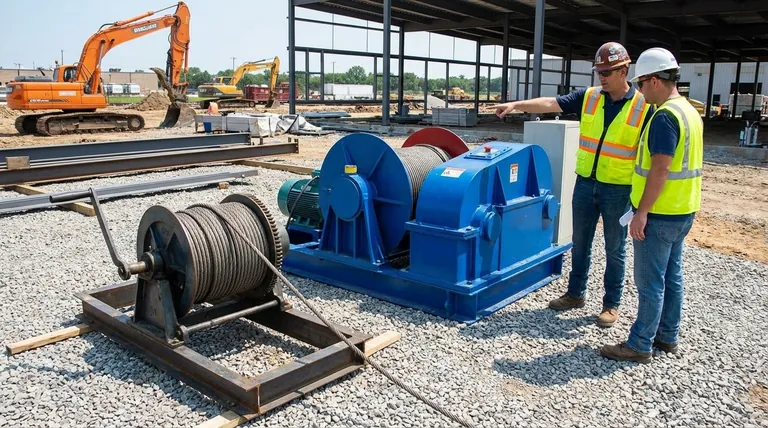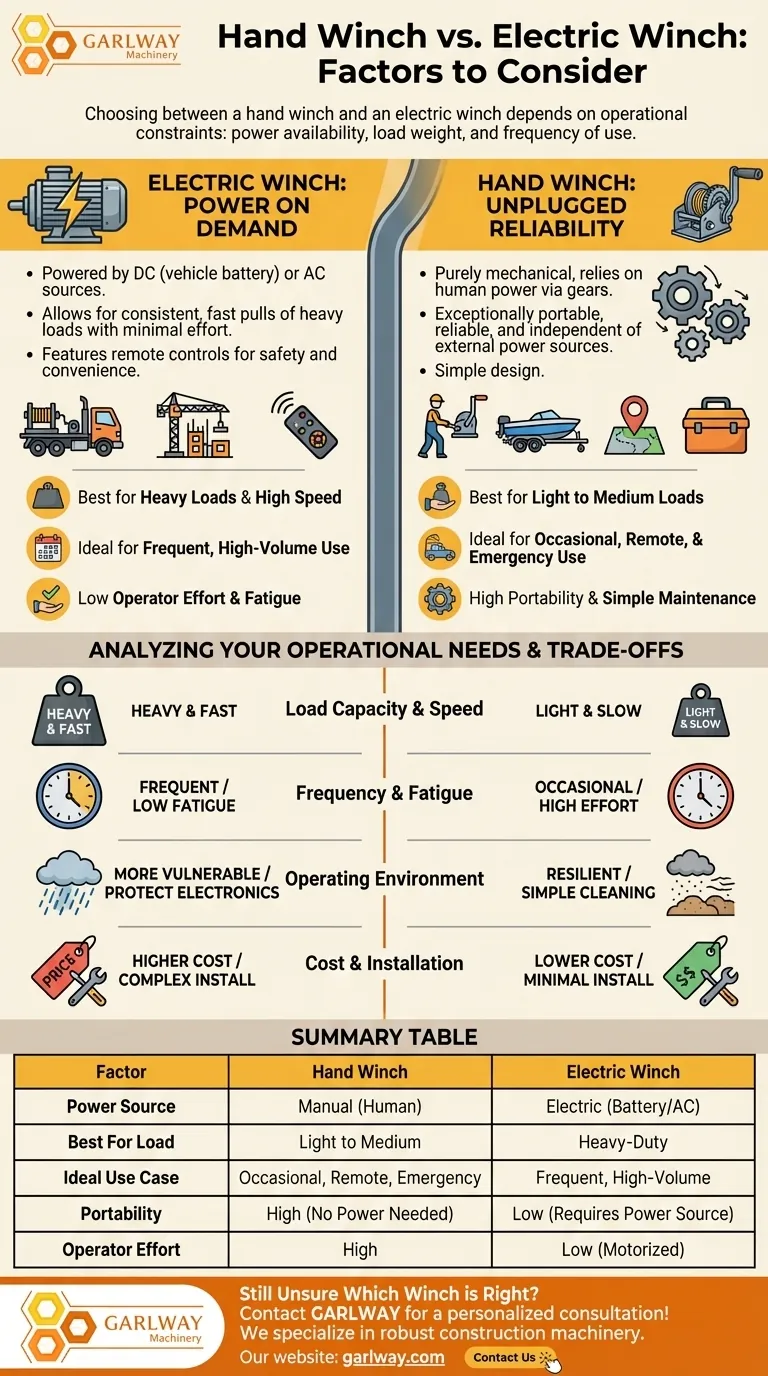The choice between a hand winch and an electric winch is determined by your specific operational constraints, primarily the availability of a power source, the weight of your typical load, and the frequency of use. Electric winches provide superior power, speed, and convenience for repetitive or heavy-duty tasks where power is accessible. Hand winches offer unmatched simplicity, portability, and reliability for occasional use or in situations where no power source is present.
Your decision is less about which winch is "better" and more about which tool aligns with the realities of your work. An electric winch prioritizes performance and efficiency, while a hand winch prioritizes independence and readiness in any environment.

The Fundamental Divide: Power and Portability
The core difference between these two tools comes down to how they generate force and where they can be deployed. This single distinction drives nearly every other consideration.
The Electric Winch: Power on Demand
An electric winch uses a motor powered by a direct current (DC) source, typically a vehicle's battery, or an alternating current (AC) source for fixed applications.
This reliance on electricity is its greatest strength and its main limitation. It allows the winch to pull heavy loads consistently and quickly with minimal physical effort from the operator.
Features like remote controls further enhance safety and convenience, making electric winches the standard for vehicle recovery, construction sites, and frequent loading operations.
The Hand Winch: Unplugged Reliability
A hand winch, or manual winch, is a purely mechanical device that relies on human power. It uses a system of gears to create a mechanical advantage, allowing an operator to pull significant loads by turning a crank.
Its independence from any external power source is its defining advantage. This makes it exceptionally portable and reliable for emergency kits, boat trailers, and remote job sites where an electric source is unavailable or impractical.
Analyzing Your Operational Needs
Beyond the power source, you must evaluate the specific demands of the tasks you need to perform.
Load Capacity and Pulling Speed
Electric winches are engineered for heavier loads and significantly faster line speeds. A task that takes minutes with an electric winch could take much longer with a hand winch.
A hand winch's effective capacity and speed are directly limited by the operator's physical strength and endurance, even with the help of gear ratios. They are best suited for controlled, slow-moving pulls.
Frequency of Use and Operator Fatigue
For any task that is performed daily or even weekly, an electric winch is the only sustainable choice. It dramatically reduces operator fatigue and increases overall efficiency.
Using a hand winch for frequent, heavy pulls is physically demanding and impractical. It is designed for occasional or emergency use where the setup time and physical effort are acceptable trade-offs for its portability.
The Operating Environment
Electric winches contain motors, solenoids, and wiring that must be protected from the elements. While many are well-sealed, they are inherently more vulnerable to water, dust, and corrosion than a simple mechanical device.
Hand winches have fewer failure points and are often more resilient in extremely harsh or dirty environments. Their simple design makes them easy to clean and maintain on the spot.
Understanding the Trade-offs
Choosing the right tool also means accepting a set of compromises. Understanding these trade-offs is key to making a decision you won't regret.
Cost and Installation
Hand winches have a significantly lower upfront cost. They are self-contained units that require minimal, if any, installation.
Electric winches are a larger financial investment. This often includes the additional cost of professional installation, heavy-gauge wiring, and potentially upgrading your vehicle's battery or alternator to handle the high amperage draw.
Maintenance and Complexity
With motors, gear trains, and electrical components, an electric winch has more potential points of failure. Maintenance involves checking electrical connections, seals, and internal lubrication.
A hand winch is mechanically simple. Maintenance is typically straightforward, consisting of little more than cleaning, lubricating the gears, and inspecting the cable or strap for wear.
Critical Safety Considerations
Both types of winches are safety-critical tools that can cause serious injury if operated improperly. Trained personnel and proper safety gear are essential.
Electric winches introduce electrical hazards and the risk of catastrophic failure if the load exceeds the capacity of the winch or its mounting points. Safety features like overload protection and emergency stops are crucial.
Hand winches pose risks from a handle that could spin back unexpectedly or from gear failure under extreme load. Maintaining a secure stance and never placing your body in the path of the handle is vital.
Making the Right Choice for Your Goal
To make a definitive decision, align your choice with your most critical requirement.
- If your primary focus is heavy, frequent use: An electric winch is the only logical choice for its power, speed, and drastic reduction of manual labor.
- If your primary focus is portability and emergency readiness: A hand winch offers unparalleled reliability and can be used anywhere, anytime, without depending on a power source.
- If your primary focus is a tight budget for light-duty, infrequent tasks: A hand winch provides a cost-effective solution without the complexity and cost of an electrical installation.
- If your primary focus is maximizing safety and control in a powered application: Choose a modern electric winch with features like a remote control, which allows you to operate it from a safer distance.
Ultimately, the best winch is the one that safely and reliably meets the specific demands of your task and environment.
Summary Table:
| Factor | Hand Winch | Electric Winch |
|---|---|---|
| Power Source | Manual (Human) | Electric (Battery/AC) |
| Best For Load | Light to Medium | Heavy-Duty |
| Ideal Use Case | Occasional, Remote, Emergency | Frequent, High-Volume |
| Portability | High (No Power Needed) | Low (Requires Power Source) |
| Operator Effort | High | Low (Motorized) |
Still Unsure Which Winch is Right for Your Project?
At GARLWAY, we specialize in providing robust construction machinery, including a full range of hand and electric winches, concrete mixers, and batching plants. Our experts understand the unique demands of construction companies and contractors worldwide. We can help you select the perfect winch based on your specific load requirements, job site conditions, and budget.
Let us help you enhance safety and efficiency on your site.
Contact GARLWAY today for a personalized consultation!
Visual Guide

Related Products
- 12000 lb Heavy Duty Electric Boat Winch
- Electric and Hydraulic Winch for Heavy Duty Applications
- Small Electric Winch 120V and 240V for Compact Applications
- Commercial Construction Mixer Machine for Soil Cement Mixing Concrete
- Electric Hoist Winch Boat Anchor Windlass for Marine Applications
People Also Ask
- How big of a winch do I need for my trailer? Choose the Right Capacity for Safe Loading
- What performance characteristics do electric winches offer? Unlock Precision Power and Control
- How does using a winch on a construction site help prevent accidents? Replace Manual Strain with Mechanical Control
- What are the typical applications for electric winches? Power Your Projects with Precision
- How does vehicle weight relate to recommended winch capacity? Choose the Right Winch for Safe Recovery
- What makes electric winches more efficient than manual or hydraulic systems? Boost Productivity & Safety
- What are the common uses of winches? Essential for Pulling & Lifting in Key Industries
- What is the primary function of an electric winch? A Powerful Force Multiplier for Heavy Lifting



















